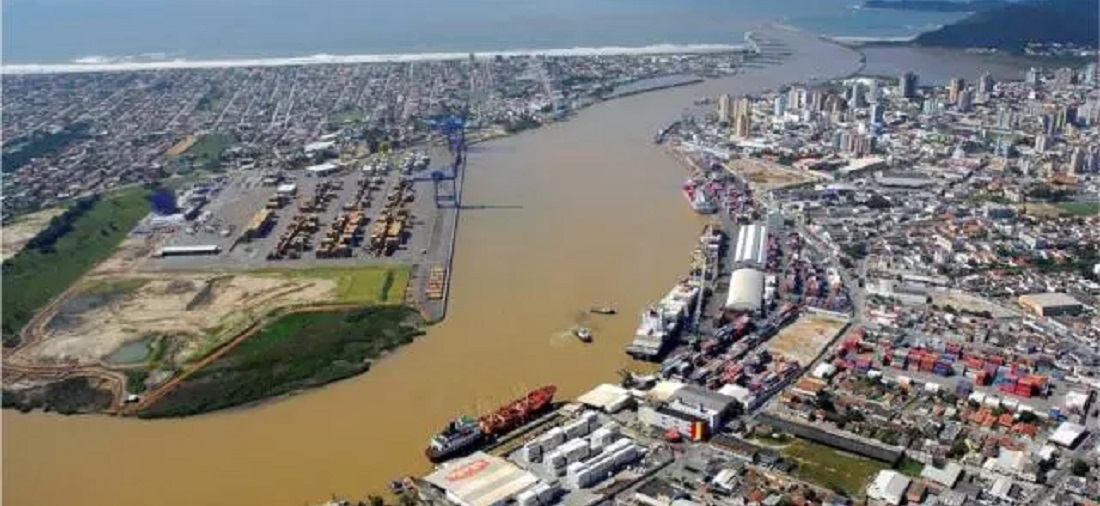
Van Oord Threatens to Halt Itajaí-Açu Dredging Over Unpaid Debts
Aug, 05, 2024 Posted by Gabriel MalheirosWeek 202432
The dredging of the access channel to the Itajaí-Açu Port Complex has become a multimillion-dollar impasse. The Superintendence of the Port of Itajaí, responsible for the service, has a debt of BRL 35 million with the Dutch company Van Oord, which is carrying out the dredging – and is threatening to suspend the work. To make matters worse, the work contract ends in December, and so far, there is no solution in sight, which could lead to the suspension of a service that is essential for the operation of the second-largest complex in terms of container throughput in the country.
In a recent meeting held by the National Waterborne Transport Agency (Antaq), Van Oord stated that it was instructed by the credit insurer to interrupt services in Itajaí if it does not receive the promised amounts.
This hypothesis looms over the terminals at the mouth of the Itajaí-Açu River. To give you an idea, every 10 centimeters lost in depth in the access channel means 40 fewer containers on each ship. This presents a logistical challenge for shipowners and a loss for the entire port chain – a consequence that will be felt in the short term. Close sources indicate that there is already a significant loss of depth in the channel in one week without dredging.
The Port Complex is located at the mouth of the Itajaí-Açu, subject to the deposition of material brought by the river. This means the access channel through which ships arrive requires permanent dredging. Brazilian legislation determines this service to be paid for with the so-called “Table 1,” a fee charged to all ships that dock at ports, whether public or private. In Itajaí, the fee is collected by the Superintendence of the Port of Itajaí (SPI), a municipal agency, since the municipality has the delegation of the port.
Since December 2022, when the lease agreement for the Port of Itajaí’s operations by APM Terminals ended, SPI has claimed difficulties in honoring the dredging contract, citing the absence of regular container ships, resulting in a lack of resources to pay for the service.
In light of this, the debt has been building up, and part of it was refinanced. Consequently, the installments, which would be R$4 million per month, are now R$7.4 million per month. Adding the refinancing amount and the new debts, the Port of Itajaí owes Van Oord R$72 million.
In May, SPI announced two fund transfers to keep the dredging up to date until the end of the year: R$20 million from the city government in two installments and R$50 million from the federal government via the Ministry of Ports and Airports.
However, only the first installment of R$10 million from the municipality has been transferred so far. Regarding the R$50 million from the federal government, behind-the-scenes information suggests it will not be sent this year for legal reasons – and may not be made effective at all. There are restrictions on the Ministry sending operating funds to a municipal agency, such as SPI, especially in an election year. Additionally, there are doubts among oversight agencies in Brasília about the solvency of the Port of Itajaí, affecting federal agency decisions.
Although funds have drastically reduced on the Itajaí side with the exodus of container ships, operations have continued at full steam at Portonave in Navegantes – and these ships also collect fees for SPI. Doubts were raised in Brasília about whether dredging was being overlooked in favor of other expenses, such as payroll.
Simultaneously, there is concern about the lack of action to bid for the continuation of the dredging service. In March, during a meeting with Antaq, SPI Superintendent Fábio da Veiga mentioned that the lack of clarity regarding the definitive lease agreement for the Port of Itajaí complicates launching a new bid since there is no certainty about the term.
Veiga also suggested another solution: he claimed that the new bidding law and the Ports Law would authorize the renewal of dredging contracts for up to 10 years, indicating that this will be SPI’s approach. However, this solution depends on authorization from oversight agencies, such as Antaq and the Federal Court of Auditors (TCU).
The contract originally signed with Van Oord in 2018 was based on previous legislation. It allows for up to 60 months of operation with the possibility of renewal for another 12 months—a term that expires on December 15. Antaq asked the port to take urgent measures for the new bidding process to avoid service interruption and suggested SPI prepare a plan B in case the renewal is not authorized.
SPI Superintendent Fábio da Veiga stated that dredging costs currently represent 70% of SPI’s budget, with canal maintenance totaling R$10.5 million. According to him, to ensure cash flow, SPI has reduced expenses by “working with half the staff it had two years ago, encouraging the operation of general cargo, and envisioning a future scenario where customs clearance (by JBS, which took over the terminal’s operation) will return with a large volume of cargo.”
Source: NSC Total
Click here to access this story’s original rendition in Portuguese: https://www.nsctotal.com.br/colunistas/dagmara-spautz/rombo-na-dragagem-do-porto-de-itajai-vira-impasse-de-proporcoes-milionarias
-
Ores
Sep, 08, 2022
0
China’s iron ore imports, stockpiles rise month-on-month
-
Shipping
Sep, 20, 2021
0
CMA-CGM suffers another cyber attack
-
Trade Regulations
Jul, 20, 2023
0
UK softens rigorous regulations over Brazilian meat exports
-
Ports and Terminals
Jun, 22, 2022
0
Auction of Suape shipyard areas postponed to July



